Does the child throw toys and do not want to comb? The advice of a psychologist will help to accustom him to accuracy.
Contents
- Teaching children neatly
- VIDEO: How to teach a child to order?
- How to teach a child how to clean and order
- How to teach a child to order in his room, at home and to independence: advice of a psychologist
- VIDEO: HOW TO TEACH A CHILD to help with housework?
- Poems about neatness for children
- VIDEO: Cartoon "Queen Toothbrush"
- VIDEO: Masha - rustyasha
You can hear how parents scold their children for an untidy look or a chronic mess in the room. Meanwhile, inaccuracy - this is a character trait, and not brought up in time habit to monitor yourself, keep in order things around him, a room or a house. It is necessary to accustom to order and accuracy from infancy. Here are some tips on how to do it right.
Teaching neatness in children
Accuracy means a person's quality, his propensity for cleanliness, order, neatness of appearance, diligence in any matters.
Although this quality can not be called congenital, it is genetically determined in some ways and depends on:
- nervous system functioning
- temperament character
IMPORTANT: Do not confuse accuracy with pedantry, which means excessive love of order and diligence in business. Psychologists have noticed that the pedantry and creativity rarely coexist in one person, and children who are obsessed with cleanliness and neatness rarely succeed in drawing, music, dancing, etc.
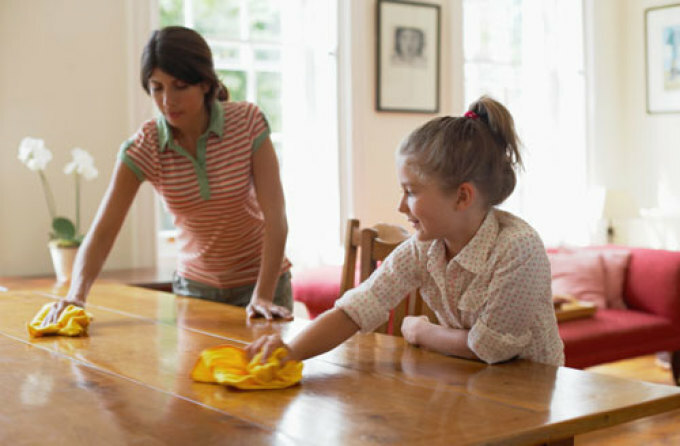 The child will be neat only if his parents are careful.
The child will be neat only if his parents are careful. Accuracy and neatness can and should be brought up, from the moment of the birth of the child. And the first very important method of such education will be the example of parents. The child should see that his mom and dad:
- follow the order and cleanliness of the house
- regularly and preferably do the cleaning together
- observe the rules of personal hygiene
- neatly dress even at home
Simultaneously, the child should emphasize the importance of these actions, because beforeof a certain age( often before school), a kid may simply not notice some things, such as uncoated hair, dirty boots, dust on furniture, etc. He needs to explain that order and organization will make his life better. The child must understand that, being neat, he:
- Saves time. When my mother forces to put things in order in the nursery, the baby seems that this cleaning lasts forever. He indefinitely puts toys and books in places, although at this time he could play, walk, watch cartoons. In fact, if you clean regularly, it takes 15-20 minutes. Much less than searching for lost toys, clothes, etc.
- Can spend more time with my mother. Cleaning at home takes a lot of time for mom, despite the modern household chemicals and home appliances. If the child will be able to help her, wiping dust, folding toys, watering flowers, etc., they will be able to play more, walk, share leisure time.
- Will live according to the rules of society. The society has rules, the fulfillment of which is necessary to be its member. In the kindergarten or on the playground, the child is convicted of ruffled hair and loose clothing, lack of diligence, inaccuracy in notebooks will spoil his academic performance at school. Accuracy will cause praise and recognition.
- . Enjoy. Well, and other "buns".After all, for the cleanliness and order, the ability to follow their parents, they praise the child, they often encourage him financially, for example, sweets and toys.
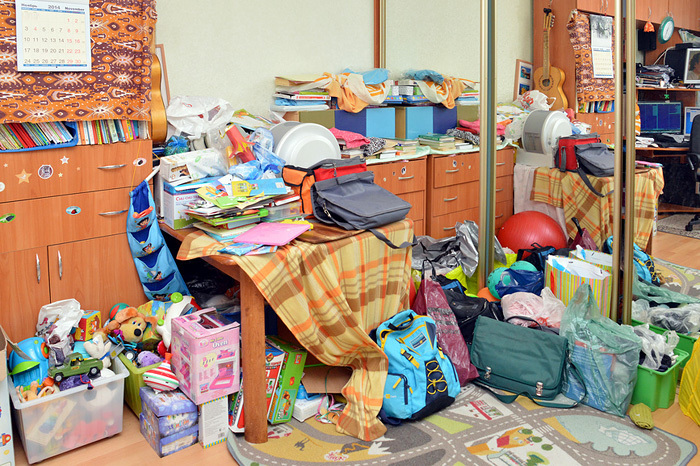 . The child needs to be convinced that the disorder is inconvenient and impractical.
. The child needs to be convinced that the disorder is inconvenient and impractical. Regarding the last point, do not overdo it here. It is quite common practice to "pay a salary" to a child for doing housework. There is a risk that the kid learns how to fold toys, take out garbage or vacuum for "candy", and not for yourself. And will rebel, if once after the demonstration of accuracy will not be rewarded.
IMPORTANT: Long notations, cries and punishments are ineffective when the child is taught to order and tidy. Violent methods will cause protest from the baby, and the positive qualities that parents are trying to bring will be rejected by them
VIDEO: How to teach the child to order?
How to accustom a child to the cleanliness and order of
Parenting in the child of love for order and neatness, diligence, must occur exclusively in the form of play at least while he is in early childhood or preschool age. Psychologists and educators agree that persuasion and conversation as methods of accustoming to accuracy are effective only in children 7 years and older.
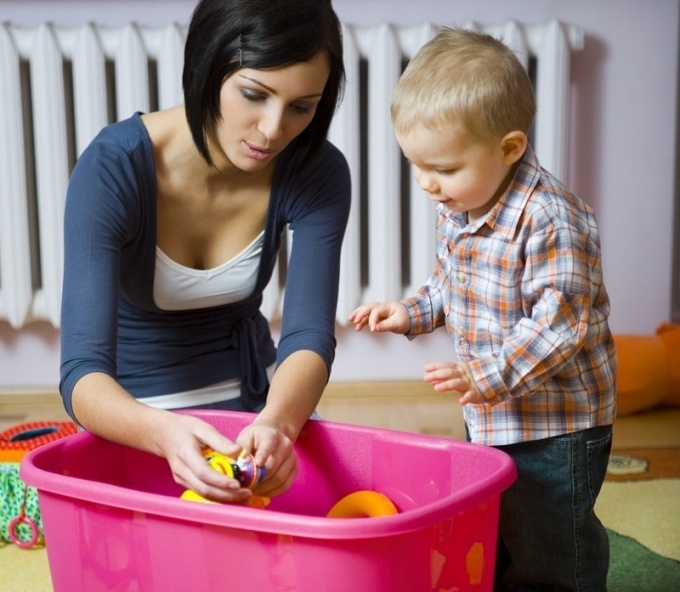 To the kid 1-3 years already on forces most to clean the toys.
To the kid 1-3 years already on forces most to clean the toys. - To begin to accustom the child to cleanliness and order it is necessary from infancy. We played, my mother took the baby for 6-8 months on the handle and said: "And now we'll lay out the toys in places."During the morning toilet, dressing for a walk, evening bathing, you need to tell the child how good it is to be clean and tidy. It is important for the baby to feel my mother's emotion
- . For a child of 1-3 years, feasible cleanliness measures, the implementation of personal hygiene rules should be included in the daily routine. Cleaning the teeth, folding the dishes in the sink after eating, cleaning the toys in places before going to bed should be perceived by the baby as a matter of course. With a daughter or son in early childhood, it is important for parents to be patient. It is clear that after the two-year-old is taken with a dust cloth, the wooden surfaces may look even worse than before the "cleaning", and my mother will have to rework everything. But the phrase "It's better to do everything yourself" has no right to break out of the lips of the parents.
- A preschool child should already have responsibilities in the home. For example, wipe the dishes, wipe the table after eating. Cleaning of the nursery is also on his shoulders. He still needs directives. At this age the child actively plays. It is important for parents to distinguish toys scattered from toys involved in the game. Even if during the director's or role-playing behavior of the child in the room, it seems to parents, it is a mess, it is impossible to interrupt the baby and make him clean. Toys - this is a game tool, not a set. They should be used by the child, and not stand on the shelves. The child will certainly remove them when the
- finishes playing. The order in the room, on the desktop, in the briefcase and in the notebooks is part of the student's self-organization. The protest against neatness, which often occurs at this age, may be due to the demonstration of independence or the elementary inability to distribute their own time. A big role now plays persistence, the sequence of parents
- Entering into the transitional age, the child often wants to be not like everyone else. His idea of individuality is not always comparable with neatness. Sharp change of image often frightens parents. Punish and ban - not an option. It is necessary to wait until the child outgrows the crisis, supports the teenager, tries to gently and unobtrusively push him to what is generally accepted
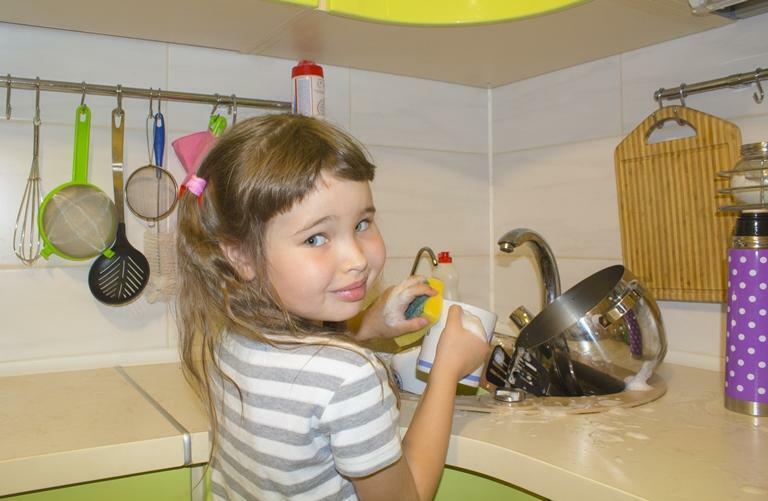 Junior schoolboy will cope with washing dishes.
Junior schoolboy will cope with washing dishes. How to teach a child to order in his room, in the house and to independence: advice of a psychologist
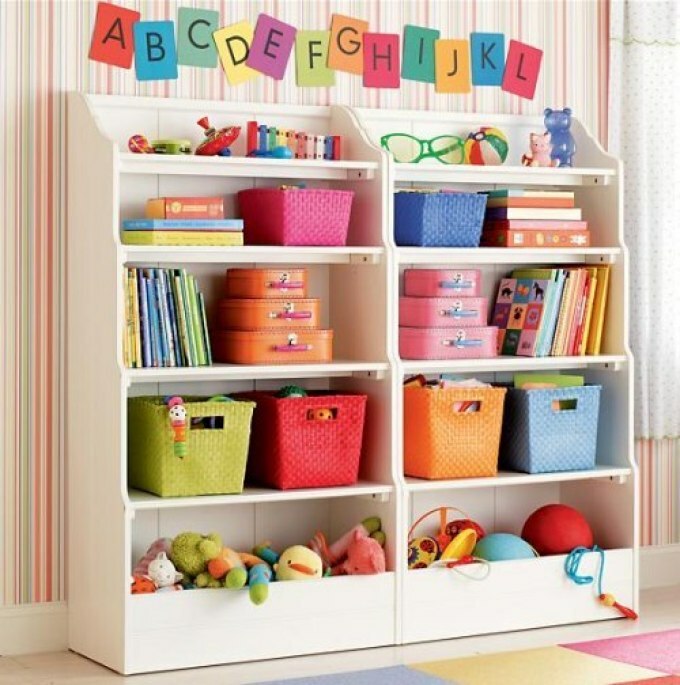 In the nursery the child should have a place to store toys.
In the nursery the child should have a place to store toys. Psychologists advise to create conditions for the child to become accustomed to the order and cleanliness in his room:
- the baby should have a day regimen that includes and cleaning in the room
- if the child does not have his own room, he needs at least a specially equipped corner
- in the corner of the child there should be special places for storing toys, books, office supplies, clothes( a wardrobe, a basket, chest of drawers, a pencil case, etc.). The
- needs to show the child where, what and how to store the
- ,Decorations( panels, photo frames, statuettes, flowerpots) that make it difficult to clean the
- in a toddler room is good to put a separate waste basket
IMPORTANT: You can buy a child a children's cleaning kit that he will use to clean up his room
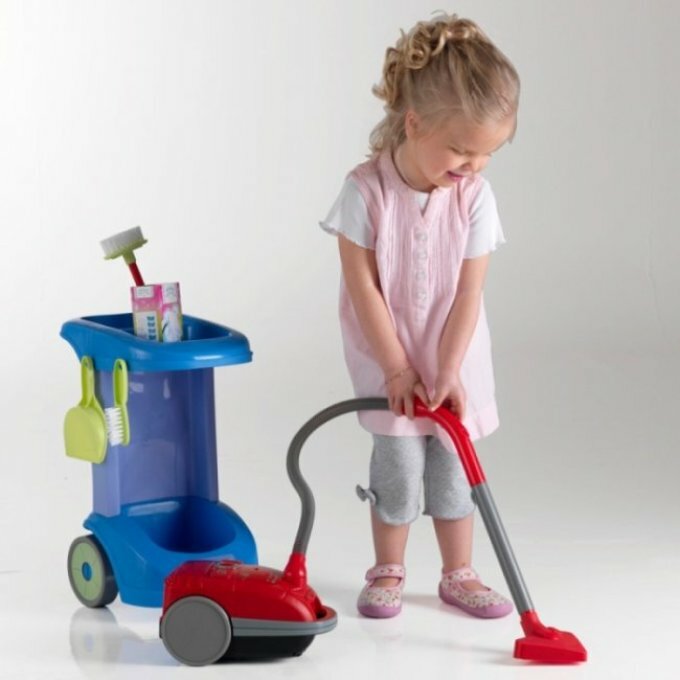 You can give a kid a play set for cleaning.
You can give a kid a play set for cleaning. With regard to the tidying up of the whole house or apartment, cleaning duties are well divided among all members of the family. A couple of hours in one of the days off can be dedicated to collective cleaning. It's fun, to the music. And after the work done, enjoy the cleanliness of the house, and along with this and a delicious lunch, a joint walk, the like.
 Shared cleaning can be fun.
Shared cleaning can be fun. IMPORTANT: But what should not be cleaning, so this is the punishment of
VIDEO: HOW TO TRAIN YOUR CHILD to help with housework?
Poems about neatness for children
Poems and riddles about cleaning and neatness will help the baby to become neat and keep his room in order.
Also, there are interesting cartoons for children about accuracy.
I'll help my mother,
I'll wash her linen with her,
I'll wipe the dust everywhere,
I'll clean the dishes,
And I'll collect the toys,
The floor in the apartment is sweeping
In the morning, before playing,
I made my bed
All my toys myself
I will place( in places)
Two clever angels.
We have a son and daughter,
Love to play cubes,
Locks to build and break.
How the children play together!
But you need to remove the toys,
To have them again tomorrow
We are to be found on the shelf.
Fast, fun together
All the place we'll take!
Interesting game
Continuing, hurray!
I.Vuimina
This Olenka is known:
What took, put in place!
Only the little girl is small:
Forgets where she took it.
Put a mug on the crib,
Put a pillow on the parquet,
Hides the boots in the cupboard.
Everything on the spot or not?
If mama did not say anything,
You need to do everything first:
Put a pillow on the buffet,
Put a mug on the parquet,
Put the boots on the bed. ..
It seems, not so again?
Olya looks guilty:
No, it was not there. ..
Help her, guys,
Put everything in order.
Z. Aleksandrova
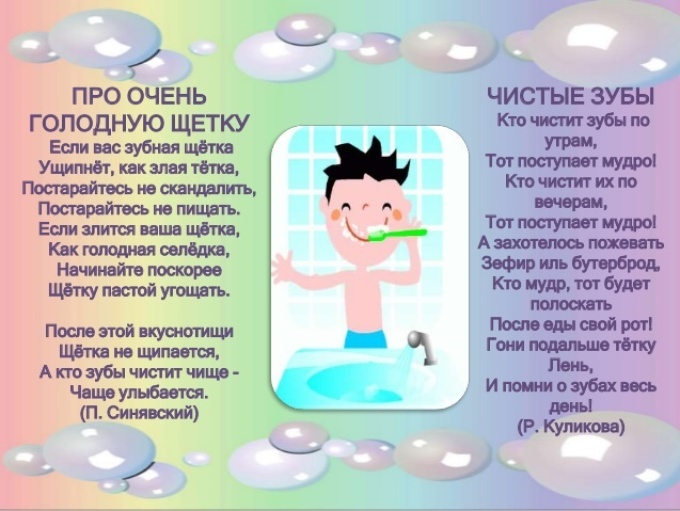 Poems about personal hygiene( we clean teeth).
Poems about personal hygiene( we clean teeth).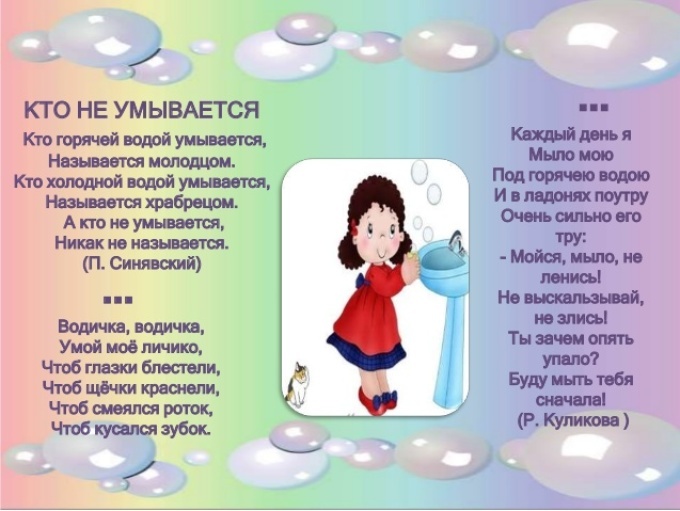 Poems about personal hygiene( wash).
Poems about personal hygiene( wash).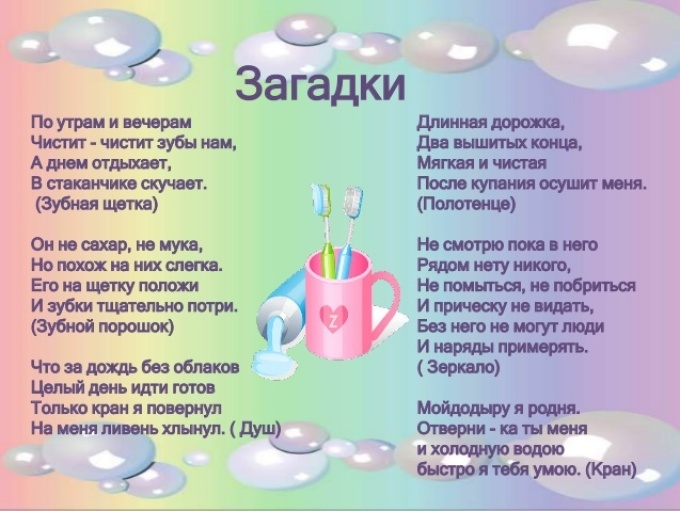 Riddles about personal hygiene.
Riddles about personal hygiene.  Poems about neatness for children.
Poems about neatness for children. 